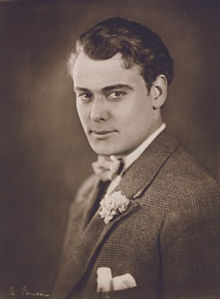Nils Asther

Nils Anton Alfhild Asther (born January 17, 1897 in Copenhagen , Denmark , † October 13, 1981 in Stockholm , Sweden ) was a Danish-born Swedish actor who had some success in Hollywood in the late silent film era .
Career
Nils Asther first studied at the renowned drama academy of the Royal Dramatic Theater in Stockholm, where he was engaged for the film in 1916 by Mauritz Stiller , who later discovered Greta Garbo . After appearing in many Swedish and German productions, Asther went to Hollywood in 1927 , where he quickly became popular. He has played in Herbert Brenons laugh, clown, laughing next to Lon Chaney and Loretta Young in Her Cardboard Lover with Marion Davies , in Loves of an Actress at the side of Pola Negri and had two appearances alongside Joan Crawford in Our Dancing Daughters and Dream of Love . In Wild Orchids and Invisible Fetters , Nils Asther was the leading man of Greta Garbo, with whom he was also a private friend. Occasionally, the Swedish actor has also been dubbed the "male Greta Garbo" ( male Greta Garbo ).
Asther, unlike Garbo, had significant problems with his accent, and his career took a heavy hit with the advent of talkies in the late 1920s. In 1929 he married Vivian Duncan, part of the sibling duo The Duncan Sisters , and toured America with her. The marriage, which resulted in a daughter, was divorced in 1932. Despite the marriage, Asther was always surrounded by rumors that he was homosexual (which some film historians also believe is likely) that further hurt his career.
In 1932 Nils Asther made a comeback in Hollywood when he signed a studio contract with Metro-Goldwyn-Mayer . Asther had taken language lessons so that he could continue to find roles in the US film industry, but his accent was still audible and he had to shift increasingly to roles as a foreigner. For MGM he played again in Letty Lynton on the side of Joan Crawford and with Kay Francis and Walter Huston in Storm at Daybreak , a love story during the First Balkan War . Columbia Pictures put him in 1933 in The Bitter Tea of General Yen , directed by Frank Capra, in the title role of the Chinese General opposite Barbara Stanwyck . That same year, Asther also worked for RKO Pictures , where he starred alongside Ann Harding in The Right to Romance and Irene Dunne in If I Were Free .
Shortly thereafter, Aster quarreled with the MGM studio boss and was blacklisted . He couldn't find work in the American film business and went to England in 1934. In 1938 he returned to Hollywood, but still appeared sporadically in supporting roles and made some cheaply produced B-movies. The attempt to start a second career on television soon failed. In the end, Nils Asther went back to Europe for good, where he made his last film in 1963. At that time he was almost only active in the theater and painted. His autobiography Narrens väg - Ingen gudasaga was published posthumously in Swedish in 1988. A star on the Hollywood Walk of Fame at 6705 Hollywood Boulevard commemorates him.
Filmography (selection)
- 1916: Icarus (Vingarne)
- 1918: The sky ship (Himmelskibet)
- 1926: The Sunken Fleet (Den sjunkna Flottan)
- 1927: Captain Sorrell and his son (Sorrell and Son)
- 1927: hotel rats
- 1928: The Blue Danube
- 1928: Laugh, Clown, Laugh (Laugh, Clown, Laugh)
- 1928: The Cossacks
- 1928: Loves of an Actress
- 1928: The Cardboard Lover
- 1928: Our Dancing Daughters
- 1928: Dream of Love
- 1928: The Hollywood Revue of 1929
- 1929: Wild Orchids (Wild Orchids)
- 1929: Invisible Shackles (The Single Standard)
- 1929: The Wrath of the Seas
- 1930: The Sea Bat
- 1932: But the Flesh Is Weak
- 1932: Letty Lynton
- 1932: Washington Masquerade
- 1933: The Bitter Tea of General Yen
- 1933: Storm at Daybreak
- 1933: The Right to Romance
- 1933: If I Were Free
- 1935: The Red Sultan (Abdul the Damned)
- 1941: Dr. Kildare: The Wedding Day (Dr. Kildare's Wedding Day)
- 1945: The Man in Half Moon Street
- 1945: Son of Lassie
- 1953: Aquel hombre de Tánger
- 1960: När mörkret faller
- 1963: Gudrun
Web links
- Detailed information about Nils Asther and his films (English)
- Full biography on Silents are Golden
- Detailed information about the collaboration with Greta Garbo
- Short biography at Golden Silents
- Nils Asther in the Internet Movie Database (English)
Individual evidence
- ^ Time Inc: LIFE . Time Inc, January 10, 1955 ( google.de [accessed July 9, 2020]).
- ^ Nils Asther | Biography, Movie Highlights and Photos. Retrieved July 9, 2020 (American English).
- ^ Nils Asther: Autobiography. In: Nils Asther. Retrieved July 9, 2020 .
- ↑ Anthony Slide: Silent Topics: Essays on Undocumented Areas of Silent Film . Scarecrow Press, 2005, ISBN 978-0-8108-5016-3 ( google.de [accessed July 9, 2020]).
| personal data | |
|---|---|
| SURNAME | Asther, Nils |
| ALTERNATIVE NAMES | Asther, Nils Anton Alfhild (full name) |
| BRIEF DESCRIPTION | Swedish actor |
| DATE OF BIRTH | January 17, 1897 |
| PLACE OF BIRTH | Copenhagen , Denmark |
| DATE OF DEATH | October 13, 1981 |
| Place of death | Stockholm , Sweden |